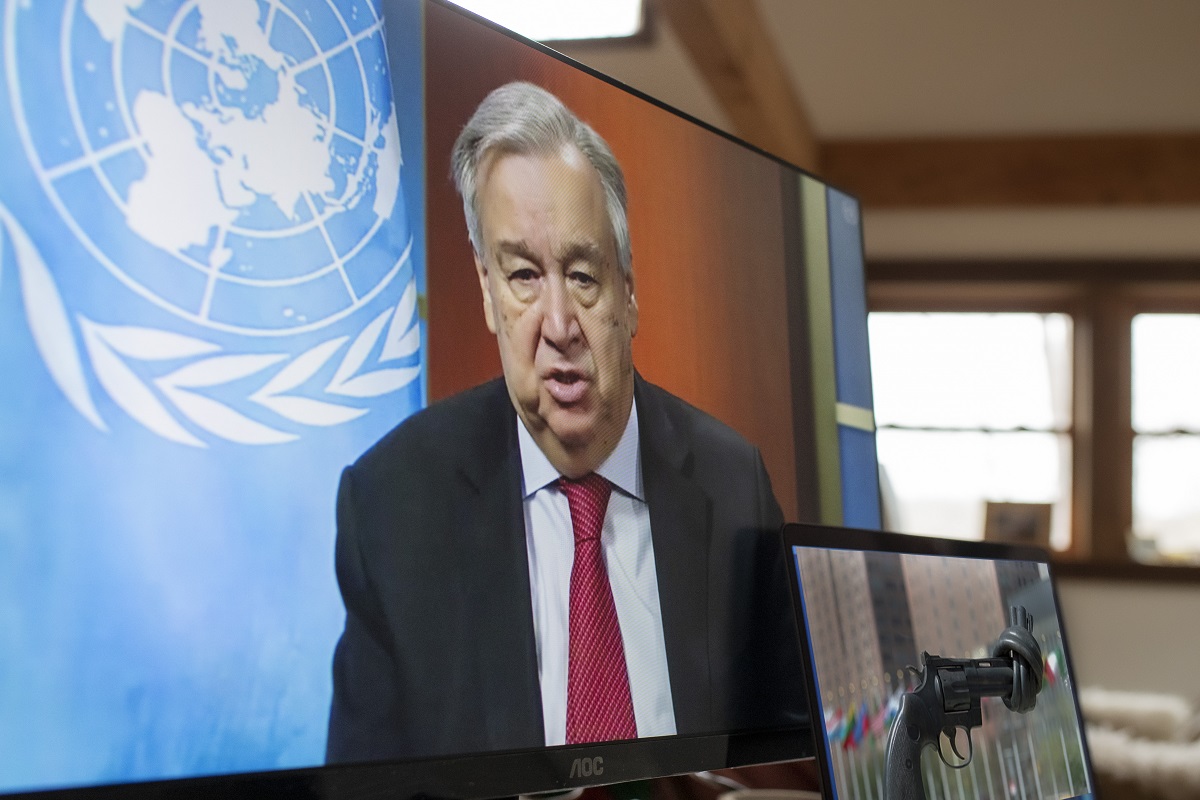Policy balance
The recent appointment of Sanjay Malhotra as Governor of the Reserve Bank of India (RBI), replacing Shaktikanta Das, signals a pivotal shift in India’s monetary policy dynamics.
Guterres recognised that the UN is facing its ‘gravest test’ since its inception, as he called the battle against COVID-19 as the fight of a generation — and the raison d’tre of the United Nations.

UN Secretary-General Antonio Guterres holds a virtual press conference. (File Photo by Mark GARTEN /AFP)
The Secretary-General of United Nations(UN) Antonio Guterres warned the UN Security Council (UNSC)on Thursday that the Coronavirus pandemic is threatening international peace and security, and has provided a window into how a bio-terrorist attack might unfold across the world. He said it is “potentially leading to an increase in social unrest and violence that would greatly undermine our ability to fight the disease.”
The UN chief Guterres listed pressing risks to the world due to the pandemic as he addressed the UNSC.
Advertisement
UN Security Council for the first time discussed the coronavirus crisis in a closed video-conference session on Thursday under the Presidency of the Dominican Republic. The 15 members discussed the pandemic’s impact on international peace and security.
Advertisement
Guterres recognised that the UN is facing its “gravest test” since its inception, as he called the battle against COVID-19 as the fight of a generation — and the raison d’tre of the United Nations.
“While the COVID-19 pandemic is first and foremost a health crisis, its implications are much more far-reaching. The pandemic also poses a significant threat to the maintenance of international peace and security — potentially leading to an increase in social unrest and violence that would greatly undermine our ability to fight the disease”, Guterres said in his briefing to the UNSC.
“The weaknesses and lack of preparedness exposed by this pandemic provide a window onto how a bio-terrorist attack might unfold and may increase its risks. Non-state groups could gain access to virulent strains that could pose similar devastation to societies around the globe”, the UN chief added.
Voicing strong concern that the threat of terrorism remains alive, Guterres said, “terrorist groups may see a window of opportunity to strike while the attention of most governments is turned towards the pandemic.”
Further, in some conflict settings, the uncertainty created by the pandemic may create incentives for some actors to promote further division and turmoil.
This could lead to an escalation of violence and possibly devastating miscalculations, which could further entrench ongoing wars and complicate efforts to fight the pandemic, Guterres said.
According to estimates from Johns Hopkins University Coronavirus Resource Centre, there are more than 1.6 million confirmed coronavirus cases across the world and over 95,000 people have died so far of the disease.
The UN chief stressed that the crisis has hindered international, regional and national conflict resolution efforts, exactly when they are needed most.
Another significant risk posed by the pandemic is that it is triggering or exacerbating various human rights challenges and refugees and internally displaced persons are particularly vulnerable.
“We are seeing stigma, hate speech, and white supremacists and other extremists seeking to exploit the situation. We are witnessing discrimination in accessing health services… And there are growing manifestations of authoritarianism, including limits on the media, civic space and freedom of expression,” he said.
The coronavirus crisis has unleashed ruinous social and economic impacts, as governments around the world struggle to find the most effective responses to rising unemployment and the economic downturn.
On Wednesday, a day after US President Donald Trump came down heavily on the World Health Organisation (WHO) over its handling of the COVID-19 pandemic and threatened to freeze funding, UN Secretary-General Antonio Guterres had urged support for the world body.
“It is my belief that the World Health Organization must be supported, as it is absolutely critical to the world’s efforts to win the war against COVID-19,” Guterres said in a statement.
“This virus is unprecedented in our lifetime and requires an unprecedented response. Obviously, in such conditions, it is possible that the same facts have had different readings by different entities,” he said, in an apparent reference to Trump’s criticism of the WHO.
“Once we have finally turned the page on this epidemic, there must be a time to look back fully to understand how such a disease emerged and spread its devastation so quickly across the globe, and how all those involved reacted to the crisis. The lessons learned will be essential to effectively address similar challenges, as they may arise in the future,” said Guterres in the statement.
Two weeks ago, the UN chief also launched the COVID-19 Global Humanitarian Response Plan, focusing on needs in countries already facing a humanitarian crisis. The Central Emergency Response Fund has allocated USD 75 million and so far the Plan had received USD 396.5 million.
Advertisement